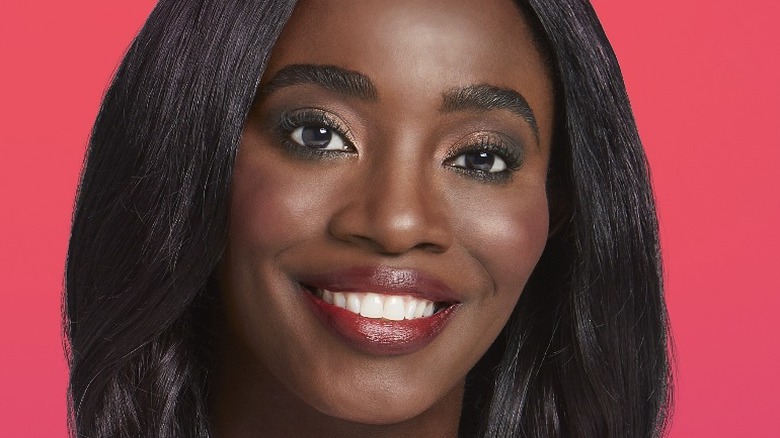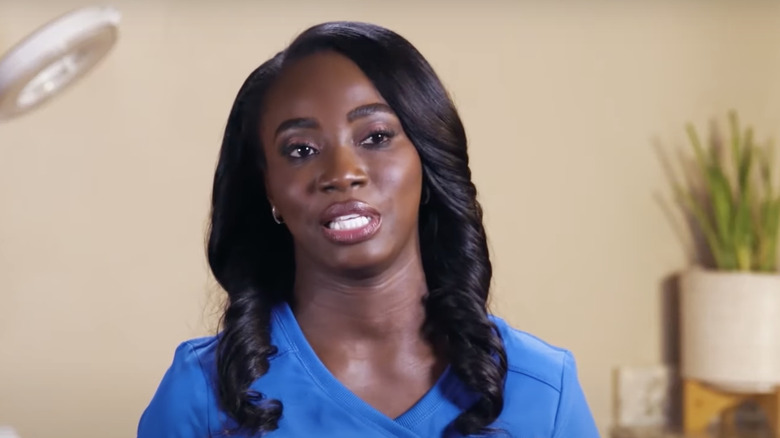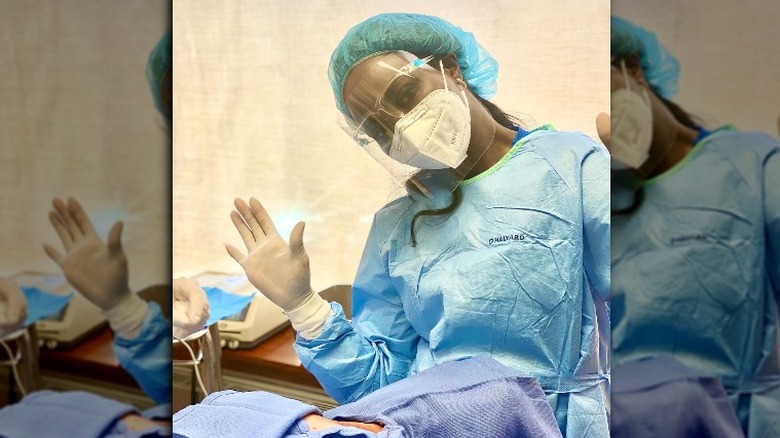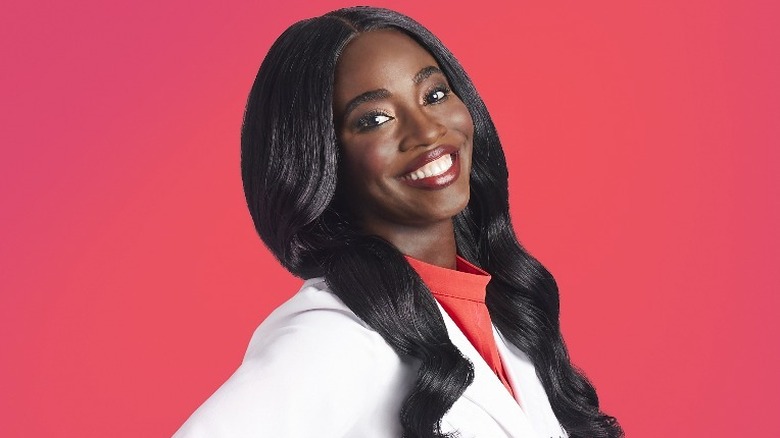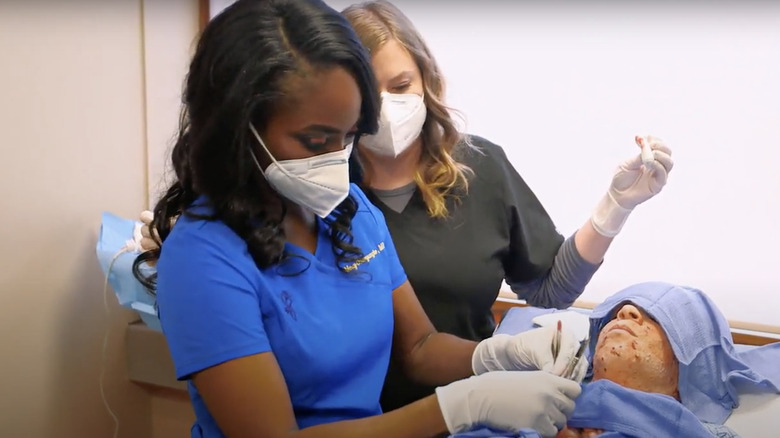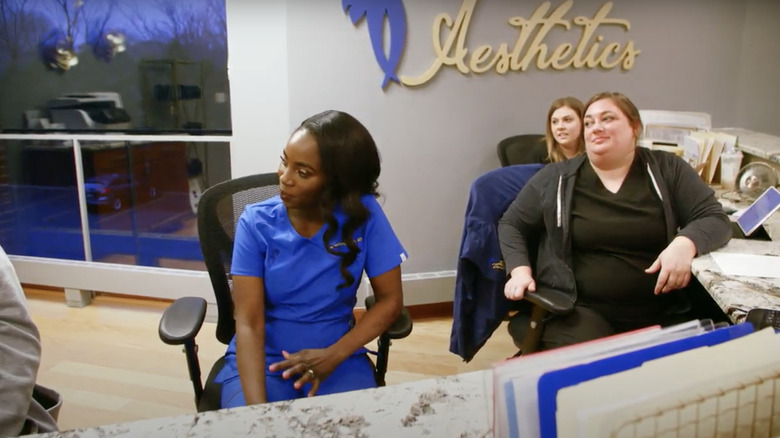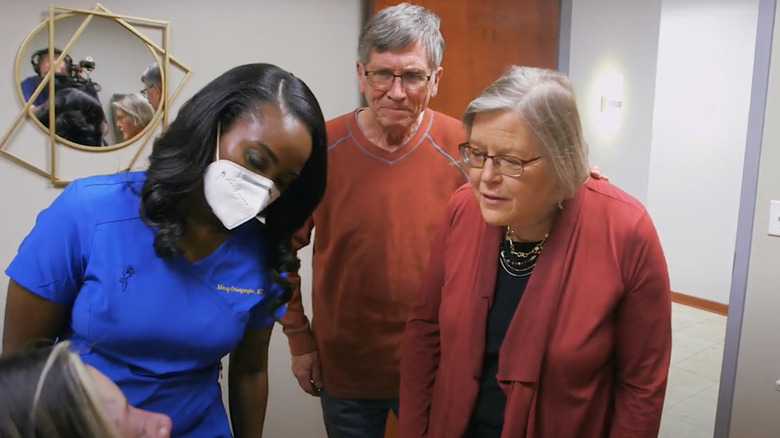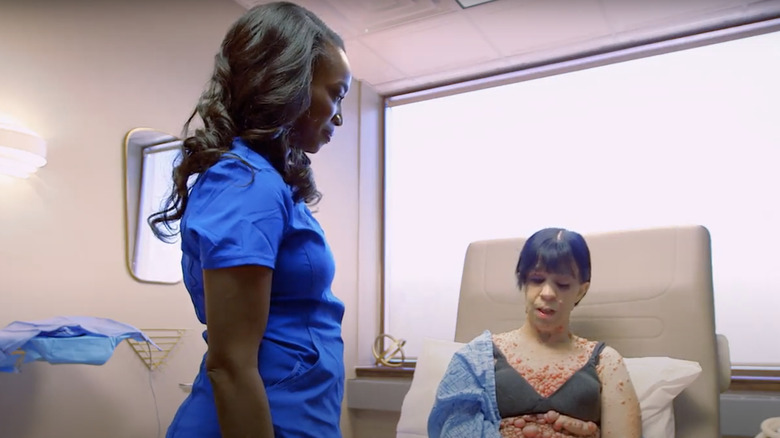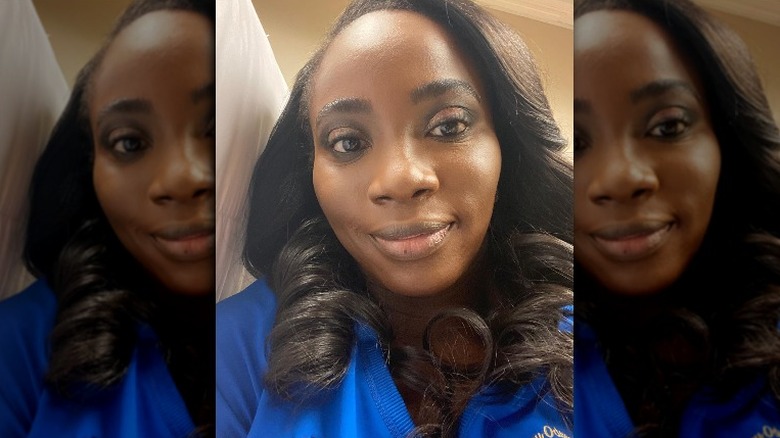TLC's Newest Star Dr. Mercy Dishes On Her Medical Series - Exclusive Interview
There's something seriously addicting about those medical shows that you just can't look away from. If you're a fan of series like "Dr. Pimple Popper" that show — in excruciating detail — the ins and outs of extreme dermatological cases, you're going to love TLC's newest show "Dr. Mercy." It follows Dr. Mercy Odueyungbo, a Chicago-based board-certified dermatologist who specializes in malignant growths, benign lesions, Mohs surgery for skin cancers, and more (via the Baraga County Memorial Hospital). But despite her impressive knowledge and expertise, she sees her patients as more than just cases — she seeks to change lives. "So, a lot of what we do in dermatology, it's not just the skin that you're treating, you're treating a person as a whole," she explained on her show, per E! News.
The List recently sat down with Dr. Mercy to learn all about the inspiration behind her career, the work that goes into her practice, and what we can expect from the exciting first season of her show. She also shared some insider information regarding her top dermatological tips that you're not going to want to miss.
Here's what initially got Dr. Mercy interested in dermatology
I saw the first episode of the season, and I would have naturally just continued to binge the entire season if I could have. I really, really enjoyed it a lot.
Thank you.
Yeah, of course. So I know that both of your parents were nurses, but I'm just curious what made you interested initially in dermatology specifically?
I actually did not know I wanted to do dermatology till three months before I graduated med school, which is kind of late. So I knew I wanted to do surgery, and I thought I wanted to be a plastic surgeon, but it wasn't ... Something was still missing. And a plastic surgeon actually suggested that I try dermatology, that I might love it. And he was right. I never looked back ever since. So I actually never thought that I would be a dermatologist if this plastic surgeon did not recommend it.
When it was recommended, what was it that really spoke to you?
I think the biggest thing is I get to do the surgeries that I wanted to do. I get to give patients immediate satisfaction. So when they come into my clinic with this large growth and these lumps and bumps, they get to leave without it. How cool is that? They leave as a different person. They're not the same person, the same way they walked in. And I just really, really enjoy that. Every day is different. So I can be doing general stuff, like just doing medical acne psoriasis, or I could be removing large tumors out of people's bodies.
You really do walk in and have on idea what your day is going to look like, huh?
Exactly.
I can imagine that probably comes with a lot of positives.
I enjoy that.
In the show, you said that you feel as though you give people their lives back in some cases, which I definitely think is true, at least just from what I could see from the first episode. But are there any patients or cases you can think of that really come to mind when you think about giving someone their lives back and changing their lives for the better?
Oh, of course. There are two in particular, where they walk in ... At first when patients walk in, when they have these large lipomas, I sometimes don't get to know how big it is, because they will walk in with bigger t-shirts. They figured out a way to hide it from society. So I'm like, "Oh, that's not bad." And then they take their shirt off. I'm like, "Oh my goodness." So when someone walks in with something that big and then they leave normal, just completely flat, they don't have to hide. They have to get a whole new closet. They can actually go out in public, go to the beach without people staring at them. That's pretty cool.
Is there anything that makes Dr. Mercy squeamish?
Yeah. And I'm curious, I'm sure you've kind of seen it all in your field, but is there anything that makes you squeamish or makes you a little uncomfortable to see?
Yeah. So most people think, because we remove all these things, I don't get sick from it. So as long as it's inside the patient's body, I'm okay. When it comes out, I'm okay. But it has to leave the room. I don't know how to explain it. Just knowing it's there and smelling it, that gets me. There's actually one episode that I ran to the bathroom to throw up.
Did you? Oh my gosh. Wow, I'm eager to see that.
Yep. It was a patient in particular that wanted to take her cyst home and was playing with it and rubbing it and shaking it and bouncing it ... By the time she did all of that, that really did me. I was like —
You were over it. No, you were over it. Do people do that a lot? Do they want to take home the cyst?
No. Most people want to see it. Most people will name it, but it's really rare to meet someone that wants to keep it or play with it.
Did she end up taking it home?
You're not supposed to do this, but I let her take two home. You have to sign a release form to take it home, but she took two home.
Interesting. Okay. Well, maybe it's sitting on her mantle right now. Who knows?
That's exactly where she said she was going to put it, in her bedroom on her mantle.
Very specific design aesthetic happening there.
What's the biggest challenge of her job?
So what would you say makes Lily Aesthetics different from other dermatological practices?
So I actually have two practices, Lily Aesthetics in Chicago and Lily Dermatology in Michigan. And Lily is my daughter's name. She's kind of the inspiration behind all of this. But I think the biggest thing is, like I said on the show, when you walk in, you're not just a patient. I take it as a privilege to be able to serve you. I take it as an honor to be able to even meet you, to come in contact with you and just for me to learn everything about you. So it's a family atmosphere, even for all my patients, for all my staff on the show. You get to see my husband. You get to meet Lily. My staff has been with me for a long time. We're like a tight-knit family and our patients feel that too.
I love that. What would you say are some of the biggest challenges of your job?
I really feel like sometimes it's hard to connect. Some patients just don't want you to go deep with them, but I try to explain that sometimes you have to go deep for me to be able to treat you completely, for me to be able to do my job. Sometimes some people are just so scared of a needle, and it takes a little longer to calm them down. Some patients are like, "Yeah, let's do this." And some patients, it literally takes me 30 minutes to make them feel okay. You know?
Yeah.
Some patients are screaming the whole time, and I'm like, "Don't scream." And I just feel so awful, because I have to remove this thing, but if you're screaming, I can't do it. Sometimes my job is tougher If I can't get the patient to calm down or just to relax.
I wonder if that's even something that you learn in medical school, like —
No.
That's probably something you just have to have internally, like your ability to calm someone down, or your bedside manner. That must be a challenge.
Yeah, no, you don't learn that. You got to figure that out on the spot.
You have no choice but to figure it out in that moment.
Exactly.
Dr. Mercy tells us about her show and working with TLC
Is there anything you can tell us about the first season and what we can expect to see?
Yeah. There's lots of transformation, lots of stories. We get to follow a lot of patients where we give them their lives back. So there are a few patients that can actually start hanging out with their kids again. Spouses, they can have a better marriage. People can actually go back and get jobs now, because they are normal again and people aren't going to be staring at them. And also, learning about people's stories and learning to be more compassionate. You never know what people are going through. I wish that we would be more compassionate as a society and just be more loving and caring. We're all going through something. So we all need each other's help.
Yeah. Well said. And can you tell us a little bit about the process of starting working with TLC and how you found each other?
Yeah. So this was not something I was looking for. I love my job, but I'm very shy. And I'm very introverted, weird enough.
I don't believe that!
So I'm in Chicago. But where I live in, in Michigan, it's called the Upper Peninsula. It's kind of like a small rural area. I'm not a person that's looking for the limelight. So in 2019, I think they were doing a nationwide casting. They were trying to expand their medical shows, and they actually found me on social media. And I thought it was a joke when they called my office saying they wanted me to audition. I was like, "Okay." And I actually didn't even think I knew what I was signing up for, but I saw it as an opportunity to help, to show positive representation of women, women running their practices, having a family and just having a positive imagery on TV and also being able to help patients and change people's lives. But they actually found me on social media, weird enough.
Dr. Mercy's audition process and her life since becoming a TV star
And then how long was that process for you before it was starting to become a reality for you?
Well, I had to go through a few auditions with the executives through Zoom. And then they did come out to my practice in Michigan to kind of see how I worked and did surgeries. And then it was only supposed to be a one-hour pilot episode, and then COVID hit. And then at some point, it was like, "I think we're just going to give you a full season instead of a one-hour thing." And I was like, "Okay." And with COVID, we kind of had to figure things out. So it was easier to fly people into Chicago. So we did it at Lily Aesthetics in Chicago.
And what are some of the biggest changes you've noticed in your own life since starting the show?
Oh my goodness. I think that, that's an interesting question, because I feel like not a whole lot has changed, just my cases get more complicated.
They know you're good.
My cases, I get the weirdest things now. And sometimes I used to be scared of doing them when I first started my practice. But now I'm like, come on, sis, we got this. I think that's probably the biggest change. I get people from five to six hours away, and my cases get a little bigger each year and a little bit more complicated.
Here are Dr. Mercy's top dermatological tips
I bet they're just going to keep growing, I'm sure. Do you have any go-to dermatological advice that you'd give our readers?
I think the biggest thing is for anything that you're suffering from, find a board-certified dermatologist. Find a doctor that you can set up a rapport with — someone that you feel comfortable with, someone that will listen to your question, someone that will take the time. I think a lot of patients get scared of medicine in general. They're very intimidated by doctors, and I didn't realize that until I met a lot of my patients. But just find someone that you click with, someone that understands you. And seek help before it gets too big.
What are some of the initial signs that people should look out for at the beginning before something gets too serious?
Oh, yes. So for example, if something starts growing, if you notice a lump in your skin, if you notice any moles that are changing color, like from pink to red, if anything's bleeding, anything going from pink to black, if you just don't feel good. I always say patients know their bodies well. Sometimes patients will say, "Dr. Mercy, this doesn't look right." And I'm like, "I think you're right." And listen to the patients, listen to your body, listen to your intuition. If it doesn't feel right, you're probably correct. And go and seek help.
That's really good advice. I think one of the reasons that a lot of people are nervous to go is because they feel like sometimes doctors can be a bit reductive to what they're experiencing. And they say, "This hurts or this doesn't look normal." And there may be like, their worries are diminished a little bit. So I love that you sound like you support your patients so much. And if they feel like something's not normal, you're going to encourage them and support them on that.
Yep.
That's great. I think that's what makes a great doctor, in my opinion.
Thank you. Thanks, Cassidy.
Dr. Mercy wants her patients to know this
If there's anything that you wish your patients would know before coming to see you, what would you say?
That it's going to be okay. I think people sometimes watch videos online before they come in. So they have this idea that, I don't know, like something horrible is going to happen to them, which is understandable. But it's going to be okay. And if I can't help you, I will find someone that can help you. But you have to take that first step. Don't watch YouTube videos on it. I would say stay off Dr. Google, because they just freak people out. You know?
Yeah.
There's no need to be scared. We can help you. We can fix a lot of things in dermatology, so no need to worry.
Awesome. Is there anything that we can expect to see moving forward? Are there any big projects that you're working on, or anything exciting coming up in your future?
Well, right now I'm just working on expanding my practice, hanging out with my daughter. This is like a quiet time in my life, so kind of taking some time to enjoy it, to slow down a little bit. Because I'm super like, go, go, go. Weird enough, I don't really have lots going on. It's on purpose. I'm just slowing down, taking care of myself and enjoying time with my family and probably take a month or two off and then just go full force again.
The experience of watching TLC's Dr. Mercy with her family
Awesome. Will you watch some of the episodes with your family?
Oh, of course. I think it's weird hearing my own voice. You probably feel the same way. It's weird watching yourself or listening to your own voice. And it's weird. I watched a few [episodes] of it, and it feels like I'm not the one doing it. I feel like I'm watching someone else. It's very strange. I feel like I'm watching someone else on TV, not me.
That is something I've heard so many people I've interviewed say.
Really?
Absolutely. Said the exact same thing, where they said that they don't like the sound of their own voice. And then they also feel as though they're watching someone else and then they're like, "Oh wait, that's me on the screen." I don't think it's normal to watch yourself back, so I can see that being a challenge. And what does Lily say? Does she think it's cool that you're on TV? What does she think?
Well, I had to do a video for TLC recently, and she has a little iPad that syncs with mine. So she just learned that my name is also Dr. Mercy. So she didn't know that. So now she goes around and calls every doctor Mercy. She's only three, so she doesn't really know. So every now and again, she will call me Dr. Mercy.
Oh, my God. She just learned that your name is not actually mom.
Exactly. Yeah. So now I'm Dr. Mercy at home.
That's so cute. Well, thank you so much for taking the time to chat with me. It's been so great talking to you. And we're so excited to watch the season coming out really soon.
Oh, thank you so much. I appreciate you taking the time to talk with me. I enjoyed talking with you, Cassidy. Thank you.
The new series "Dr. Mercy" begins Wednesday, September 22 at 9 p.m. ET/PT on TLC.
